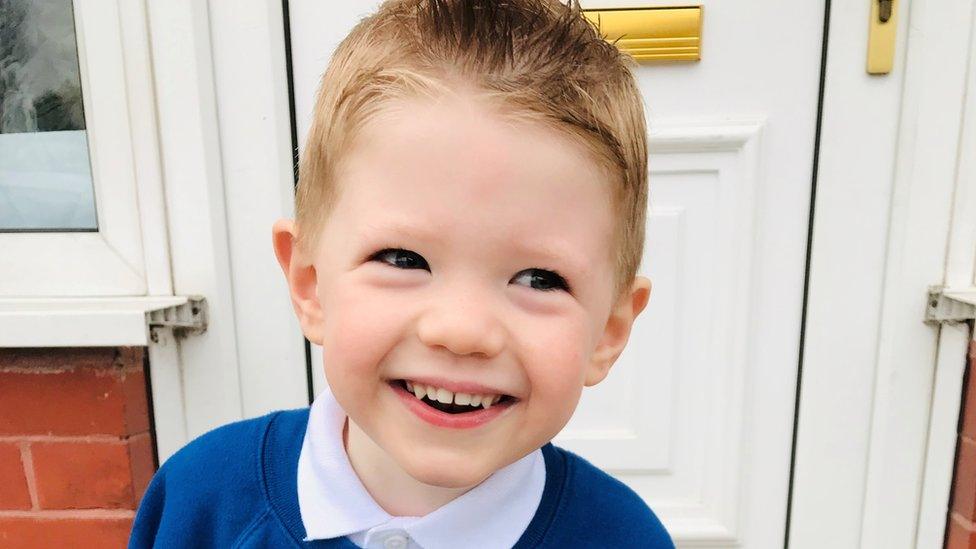Sudden unexplained death in childhood: 'Why did my beautiful son die?'
- Published
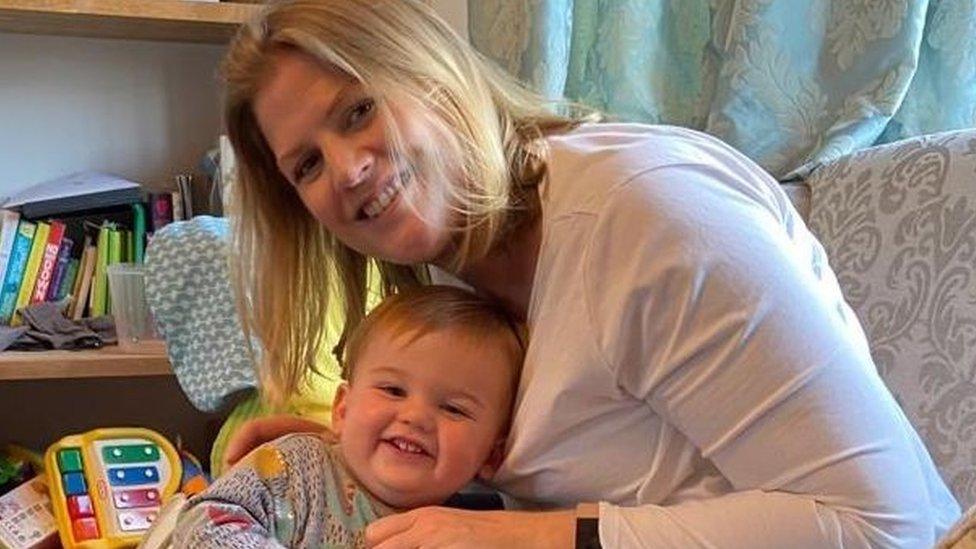
Louis Rogers was a healthy, energetic little boy.
Last summer, his mother Julia put him to bed as usual. An hour later, she went to check on him. He had died, six weeks away from his second birthday, without crying out for help or making any sound at all.
It was only later the London-based marketing professional was given a leaflet about sudden unexplained death in childhood (SUDC), a rare category of death in which the cause remains unknown even after thorough investigation, including a post-mortem examination.
As with sudden infant death syndrome (SIDS), a condition more commonly known as cot death, many cases involve children dying while asleep. In contrast to SIDS, external, though, there have been no awareness campaigns.
Here, in her own words, Julia, 41, talks about what happened to Louis, and her frustration over the lack of research being carried out into SUDC.
'He'd make the most of everything'
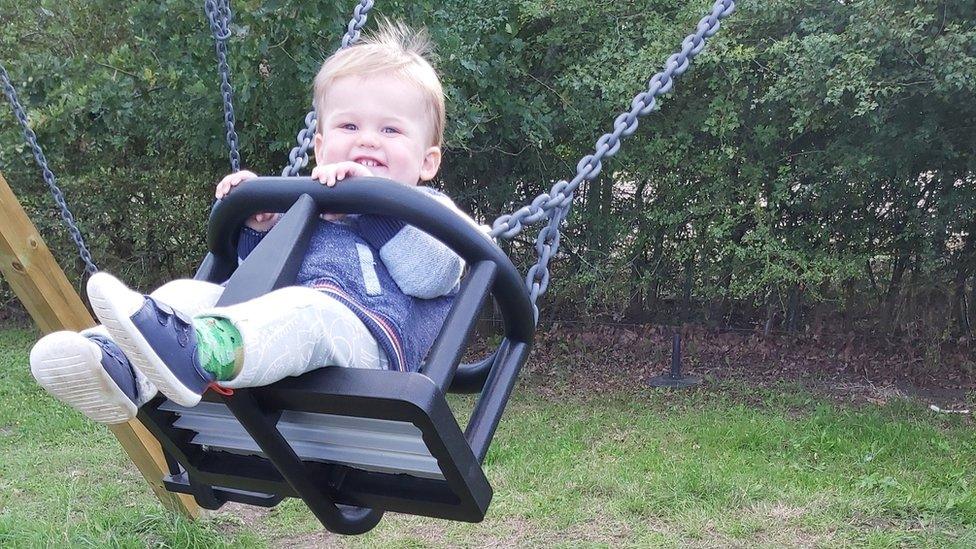
He was just an absolute joy, the most affectionate little boy. He had a beautiful smile, his laugh was so funny.
He would go to the park and only go on the swing and not be interested in anything else. When we'd go to soft play, he would only go down the yellow slide, over and over again. He'd make the most of everything, even a puddle - he'd be like 'it's the best thing ever!'
Louis was healthy, a really strong boy. His development was good.
When he was 13 months old, he had his first seizure. We were down by the lock to see the boats when it happened. I just remember him making this little noise and his arms went up in the air.
I started screaming because he was shaking and he'd started foaming at the mouth. I thought he was dying. After a couple of minutes I'd thought he had because he went blue. The ambulance came really quickly. They took his temperature and he didn't have one so they took it really seriously.
We went on blue lights to the hospital. He was really sleepy but was breathing. They all rushed in and hooked him up to monitors. They took his temperature again and that time he had one and they literally unplugged everything and left the room. I didn't know what was going on.
'He never said bye again'
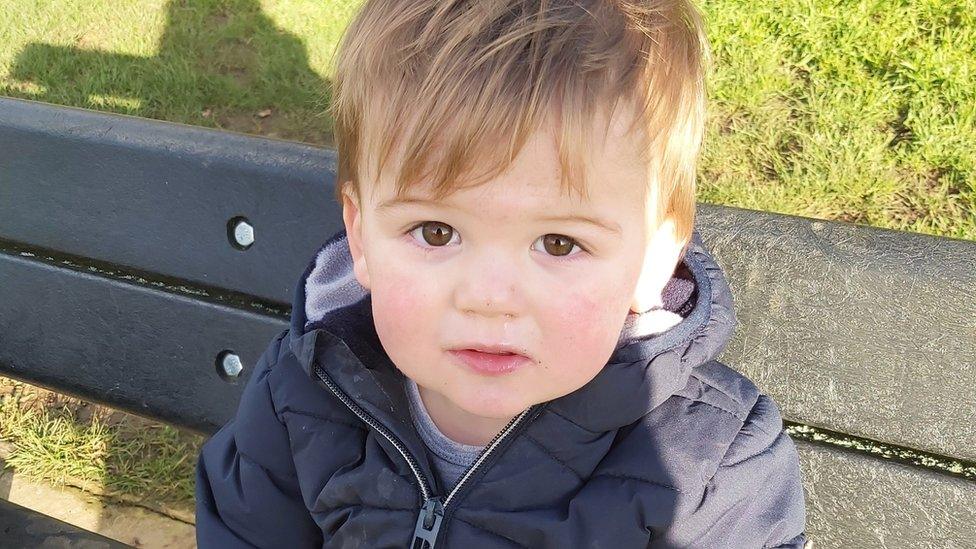
I realised later they had decided it was a febrile seizure and therefore it was absolutely nothing to worry about.
The paediatrician came and was so casual about it, saying, "There's nothing to worry about, lots of children get them."
I was then told if he had another one I probably wouldn't need to call an ambulance but could do as he's young. I didn't think to ask what happens if he has one when he's asleep, and toddlers sleep more than half the day. They didn't mention it.
After that first seizure, I felt like it took something from him. When we picked my daughter up from school he would say "bye" to everyone, it was really cute, and after the seizure he stopped doing that, he never said bye again. He was picking up more words and they said not to worry but I did. I just knew something wasn't quite right.
'The lack of awareness is staggering'
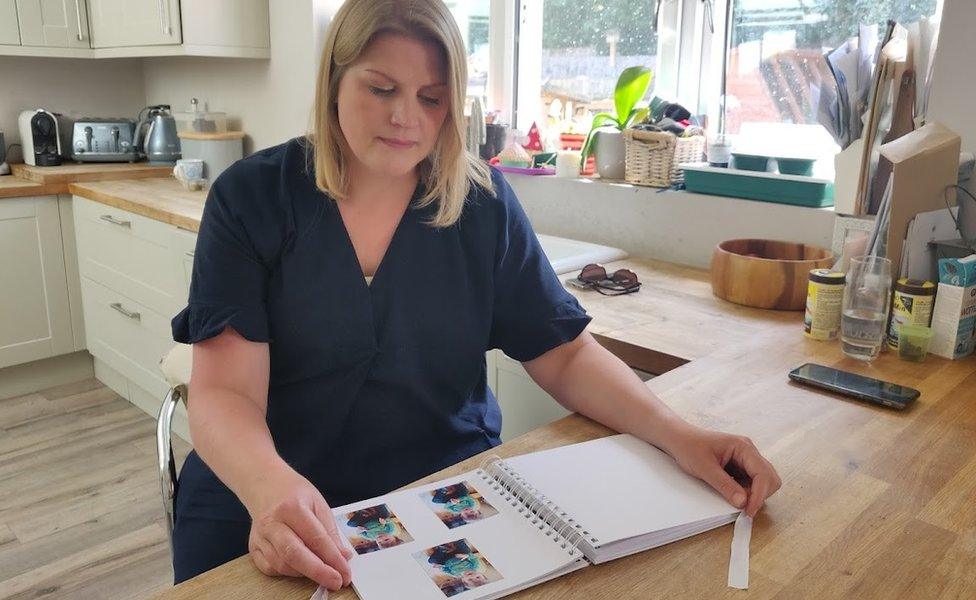
When he was 18 months old he had another seizure.
He was at nursery, I was at home. I ran straight there. They had called an ambulance and when we got to the hospital they couldn't have been less concerned. They said it's a febrile seizure again because he's got an ear infection.
As soon as they decided it was one, it's as if they're trained to think it's not serious. There's no compassion, no kind of pathway for what happens next, and I didn't feel listened to.
Then, when we got home, he had another one.
The ambulance came over and the paramedic said because we'd seen a doctor already, we didn't have to take him in, because all they were going to do was see him and probably send us home again. Louis had been through a lot that day and was really tired so I agreed to let him rest at home.
I found out later that if a child has two febrile seizures within 24 hours, it's called a complex seizure which should be referred to a paediatrician for an EEG, external.
They should have picked up on that. There's so little awareness about the risk; everyone is so casual and flippant. I don't think anyone is intentionally - no-one is ignoring it - it's just staggering, the lack of awareness.
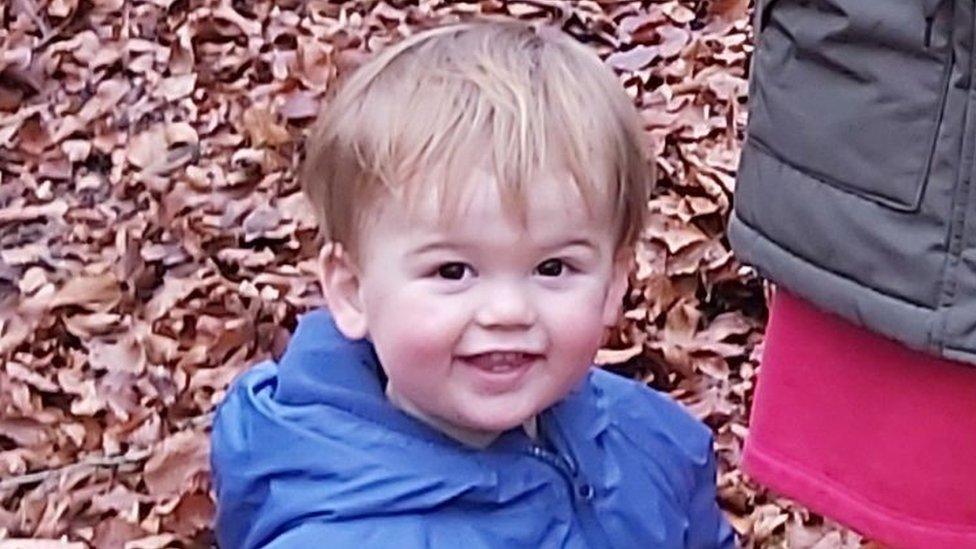

Sudden unexplained death in childhood and febrile seizures
SUDC covers children aged one and upwards
Although the number of deaths is difficult to determine, it is estimated that about 40 children over the age of one die suddenly every year - more than young child deaths from traffic accidents, fires or drowning
As with cot deaths, most SUDC cases occur during sleep
About 12,000 scientific studies have been published into SIDS - only 50 have been for SUDC
It is estimated about a third of SUDC cases involve children who have had febrile seizures
These seizures (febrile convulsions) are fits that can happen when a child has a fever. They happen most frequently between the ages of six months and three years
A high temperature caused by an infection can stimulate the release of cytokines, proteins that affect the parts of the body responsible for regulating temperature. For some children, high levels of cytokines may temporarily "scramble" the workings of the brain and nervous system, triggering a seizure
Source: NHS England / SUDC Charity, external/ Neurologist Dr Orrin Devinsky

A couple of months later, he became uncoordinated and his right eye was a tiny bit lower. He fell down the front step; it was just a toddler fall, so we carried on and went swimming. I didn't think at the time it could have been connected to his seizures.
At the end of that week, the nursery phoned and said it was almost like he was having lots of mini-seizures, like his eyes were flitting. I took him to the GP that afternoon and I gave them the whole history, so the doctor could also have picked up on him having two in 24 hours.
The doctor asked if I could walk Louis across the room so I did and he said, "I can't see anything." I remember saying to him, "What should I do? Should I keep a diary of all these episodes?" "Oh yeah, if you want," he replied.
Louis died the next month.
'I didn't hear anything, I didn't see anything'
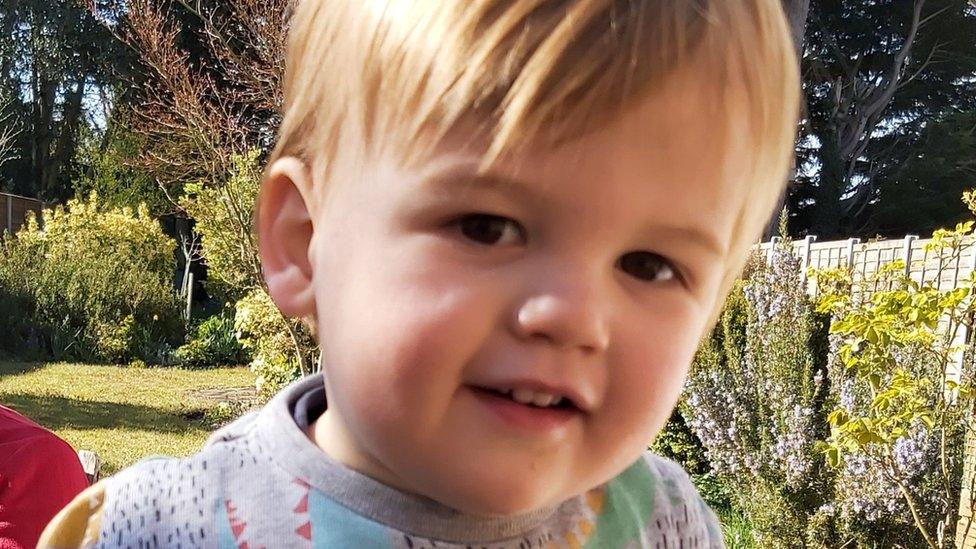
I don't know if it's like this with other parents or people who've had a sudden loss, but you get stuck in that time and it's like torture. You just replay it.
He had had a temperature that day so I kept him off nursery. He perked up in the afternoon and I thought he was getting better; he only had enterovirus which apparently is a really common, mild illness.
Louis had a bath and then I put him in his bed before going upstairs to read his sister a bedtime story. I was in the next room and had the baby video monitor on. I didn't hear anything, I didn't see anything.
I felt like I had to check on him. I can't remember at what point but it just crept into my mind and that's what set the alarm bells off, because on the monitor I didn't see him move at all after I put him down.
I remember walking through and it was silent - with kids you can hear them breathing - but it was eerily silent. I called his name and stroked his hair but he didn't move and so I rolled him over and he'd already died.
I don't know if he died immediately when he went to sleep or later. You think if your child's ill, you'll have a chance to go and help them because they'll be crying, or you'll hear them being sick - there'll be something where you can go and help them.

If you have been affected by the issues raised in this story, help and support is available via the BBC Action Line

The hypothesis in Louis's post-mortem is he had a seizure and he didn't wake from the postictal (recovery) phase but because it doesn't mark the brain, they can't prove it. It goes down as SUDC.
I've since seen a webinar and it hurt me so much because they were saying there can be difficulties with breathing during the reset when you're on your front so they said 'just roll them over'. That's all I had to do.
'It felt quite conspiratorial'
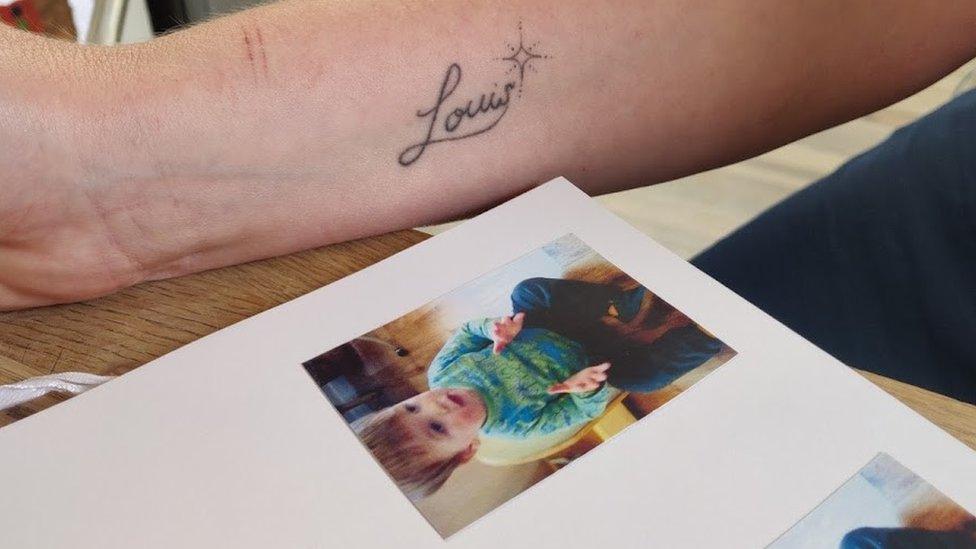
After he passed away, a nurse gave me a leaflet for SUDC. I'd never heard of it.
I connected with the SUDC charity and began talking to other parents who had gone through the same thing. I then became horrified because many were talking about their children having febrile seizures.
It felt quite conspiratorial. People must know there's a link because there's all these other families. It's more than once a fortnight that this is happening but nobody is acknowledging it other than NHS Scotland who have put on their website, external that there's a potential link between febrile seizures and SUDC, but on NHS England, external there's nothing.
There's very little awareness, or a very mixed amount of awareness, in the medical community. He wasn't under anyone's wing, he didn't get referred to a paediatrician or have any follow-up; it was just lots of isolated events. I just feel like he was really let down.
I felt like we were overanxious parents that go to the doctor and then you get dismissed. Throughout that whole time, nobody took me seriously.
Doctors should talk to parents, even if they don't have all the answers. They shouldn't infantilise parents, or try and protect them. I would have had a breathing monitor on the mattress if I'd known.
But there's nothing to make you aware. There's nothing to say there is a link between febrile seizures and SUDC - it's very rare but there may be a link. It hasn't been proved but then not enough research is taking place to make that connection. It's obvious though to any parent who loses their child with a history of febrile seizures.
That really hurts because it makes me feel like is this acceptable? Is my child's death acceptable because it's rare? What are the statistics that would make people pay more attention?
I don't understand. It's too many. Even one is too many. If it's something we don't know enough about then we should want to find out. That's the most difficult thing.
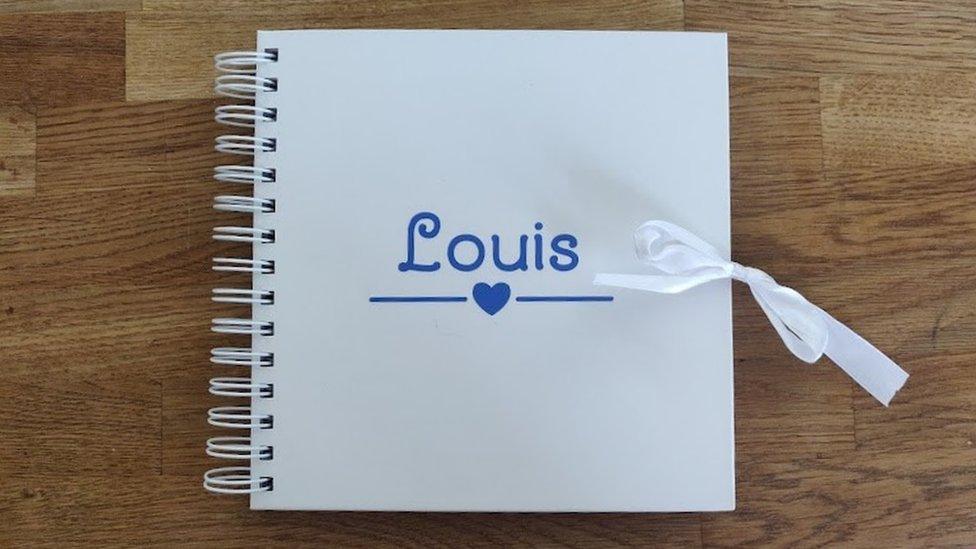
I can accept sadly he's passed away, but I cannot accept nothing will change. I can't do that.
He was only six weeks away from his second birthday when he died. He lost his whole future.
I miss him every single moment. It will never leave me and I never want it to.
As told to Rebecca Cafe

NHS Digital said it "routinely reviewed the website in consultation with clinical experts to keep them in line with the most up-to-date evidence and guidelines".
It added any updates would be in line with National Institute for Health and Care Excellence (NICE) guidance and NHS England policy.
NICE said it did not have a specific guideline for febrile seizures and the link with SUDC but added its guidelines do say how urgently children aged under five who have seizures and a fever should be seen.
The Medical Research Council confirmed it had not funded any research that directly investigated a link between febrile seizures and SUDC but said it "encourages the scientific community to come forward with their best ideas for funding".
The Royal College of Emergency Medicine (RCEM) said all trainees were taught about febrile seizures and that doctors were aware that rare complications could occur in any illness, however "this is not something that was specifically taught normally in the context of febrile seizures".
Rob Stafford, chair of the Paediatric Emergency Medicine Professional Advisory Group, said the RCEM had not commissioned any research to prove a definitive link between febrile seizures and SUDC or produced a patient information leaflet which would specifically advise parents what to do should their child have a febrile seizure while sleeping.
"Resuscitation for seizures in children as described in the Advanced Paediatric Life Support guidelines, external is the accepted standard of care in the UK," Dr Stafford said. "This would normally include talking and educating parents about what to do if they (children) are unwell or have a seizure, including when to return to hospital. It would be normal practice to give parents an information leaflet regarding febrile seizures at the time of discharge."
He said a commonly used leaflet could be found on the Healthier Together website, external.
Related topics
- Published18 June 2022
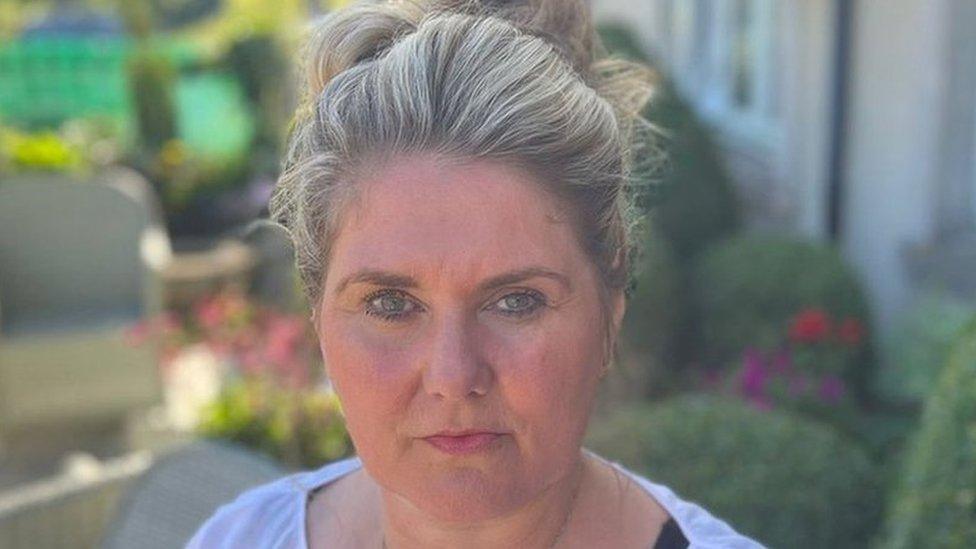
- Published10 March 2021
